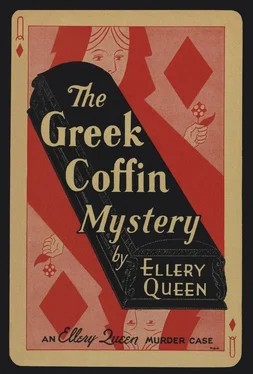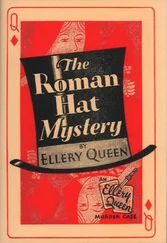The study erupted in little conversations, assorted comments, half-hearted protests. Woodruff twiddled his thumbs before the desk and eyed Nacio Suiza benevolently; Suiza thereupon grinned and offered himself to Cohalan as the first victim. The women straggled out of the room; and Velie snatched one of the telephones. “Police Headquarters... Gimme Johnny... Johnny? Get Edmund Crewe down to Eleven East Fifty-fourth right away. Rush job. Snap into it.” He leaned against the desk and watched frostily, Pepper and Woodruff by his side, as the three detectives took the men one by one and explored each male body with a thoroughness and impersonality that was shameless. Velie moved suddenly; Reverend Elder, quite uncomplaining, was due to be the next victim. “Reverend... Here, Flint, none o’ that! I’ll waive a search in your case, Reverend.”
“You will do nothing of the kind, Sergeant,” replied the minister. “According to your lights I am as much a possibility as any of the others.” He smiled as he saw the indecision on Velie’s hard face. “Very well. I’ll search myself, Sergeant, in your presence.” Velie’s scruple at laying irreverent hands on the cloth did not prevent him from watching with keen eyes as the pastor turned out all his pockets, loosened his clothes and forced Flint to pass his hands over his body.
The matron trudged back with a laconic grunt of negation. The women — Mrs. Sloane, Mrs. Morse, Mrs. Vreeland and Joan — were all flushed; they avoided the eyes of the men. “The fat dame upstairs — housekeeper? — she’s okay too,” said the matron.
There was silence. Velie and Pepper faced each other gloomily; Velie, confronted by an impossibility, was growing angry and Pepper, behind his bright inquisitive eyes, was thinking hard. “There’s something screwy somewhere,” said Velie in an ugly voice. “You’re dead sure, matron?”
The woman merely sniffed.
Pepper grasped Velie’s coat-lapel. “Look here, Sergeant,” he said softly. “There’s something vitally wrong here, as you say, but we can’t butt our heads against a stone wall. It’s possible that there’s a secret closet or something in the house that we didn’t find. Crewe, your architectural expert, will certainly locate it if it exists. After all, we’ve done the best we can, all we can. And we can’t keep these people here forever, especially those who don’t live in the house...”
Velie scuffed the rug viciously. “Hell, the Inspector’ll murder me for this.”
Things happened swiftly. He stepped back, and Pepper politely suggested that the outsiders were free to leave, while those who lived, in the house were not to quit the premises without official permission and without being searched thoroughly each time. Velie crooked his finger at the matron and Flint, who was a muscular young man, and led the way out into the hall and to the foyer, where he grimly took his stand by the front door. Mrs. Morse uttered a little squeal of terror as she shuffled toward him. “Search this lady again, matron,” growled Velie... The Reverend Elder he favored with a bleak smile; but Honeywell the sexton he examined himself. Meanwhile Flint was again searching Undertaker Sturgess, his two assistants, and a bored Nacio Suiza.
As in all former searches, the result was empty air.
Velie stamped back to the library after the outsiders left, stationing Flint on guard outside the house, where he could watch both the front door and the front basement door below the stone steps. Johnson he dispatched to the back door at the top of a flight of wooden steps leading down into the court; Cohalan he sent to the rear door level with the court, which led out of the rear of the basement. Pepper was engaged in earnest conversation with Joan Brett. Cheney, a much chastened young man, rumpled his hair and scowled at Pepper’s back. Velie swung a horny finger at Woodruff.
Edmund Crewe was so perfectly the picture of the absent-minded professor that Joan Brett only with difficulty repressed an alarming impulse to laugh aloud in his horsy lugubrious face, pinched nose and lusterless eyes. Mr. Crewe, however, began to speak, and the impulse died aborning.
“Owner of the house?” His voice was like a wireless spark, pungent and crackling.
“He’s the guy that kicked off,” said Velie.
“Perhaps,” said Joan, a little abashed, “I can be of service.”
“How old’s the house?”
“Why, I–I don’t know.”
“Step aside, then. Who does?”
Mrs. Sloane blew her nose daintily in a tiny scrap of lace. “It’s — oh, eighty years old if it’s a day.”
“It’s been remodeled,” said Alan eagerly. “Sure. Remodeled. Loads of times. Uncle told me.”
“Not specific enough.” Crewe was annoyed. “Are the plans still in existence?”
They looked doubtfully at each other.
“Well,” snapped Crewe, “does anybody know anything?”
No one, it seemed, knew anything. That is, until Joan, pursing two excellent lips, murmured, “Oh, wait a moment. Is it blueprints and things you want?”
“Come, come, young woman. Where are they?”
“I think...” said Joan thoughtfully. She nodded like a very pretty bird and went to the dead man’s desk. Pepper chuckled appreciatively when she rummaged through the lowest drawer and emerged finally with a battered old cardboard filing-case bursting with yellowed papers. “An old paid-bill file,” she said. “I think...” She thought clearly, for in no time at all she found a white slip of paper with a folded set of blueprints pinned to it. “Is this what you want?”
Crewe snatched the sheaf from her hand, stalked to the desk and proceeded to burrow his pinched nose into the blueprints. He nodded from time to time, then suddenly rose and without explanation left the room, the plans in his hand.
Apathy settled again, like a palling mist.
“Something you ought to know, Pepper.” Velie drew Pepper aside and grasped Woodruff’s arm with what he considered gentleness. Woodruff whitened. “Now, listen, Mr. Woodruff. The will’s been grabbed off by somebody. There’s got to be a reason. You say it was a new will. Well, who lost what by it?”
“Well—”
“On the other hand,” said Pepper thoughtfully, “I can’t see that the situation, aside from its criminal implications, is very serious. We can always establish intention of testator from your office copy of the new will, Mr. Woodruff.”
“The hell you can,” said Woodruff. He snorted. “The hell you can. Listen.” He drew them closer to him, looking around cautiously. “We can’t establish the old man’s intention! That’s the funny part of it. Now get this. Khalkis’ old will was in force up to last Friday morning. The provisions of the old will were simple: Gilbert Sloane was to inherit the Khalkis Galleries, which includes the art-and-curio business as well as the private art-gallery. There were two trust-funds mentioned — one for Khalkis’ nephew Cheney and one for his cousin Demmy, that half-witted yokel over there. The house and personal effects were bequeathed to his sister, Mrs. Sloane. Then there were the usual things — cash bequests to Mrs. Simms and Weekes, to various employees, a detailed disposition of art-objects to museums and so on.”
“Who was named executor?” asked Pepper.
“James J. Knox.”
Pepper whistled and Velie looked bored. “You mean Knox the multi-millionaire? The art-bug?”
“That’s the one. He was Khalkis’ best customer, and I would say something of a friend, too, considering the fact that Khalkis named him executor of his estate.”
“One hell of a friend,” said Velie. “Why wasn’t he at the funeral to-day?”
“My dear Sergeant,” said Woodruff, opening his eyes, “don’t you read the papers? Mr. Knox is a somebody. He was notified of Khalkis’ death and intended to come to the funeral, but at the last minute he was called to Washington. This morning, in fact. Papers said it was at the personal request of the President — something to do with Federal finance.”
Читать дальше












